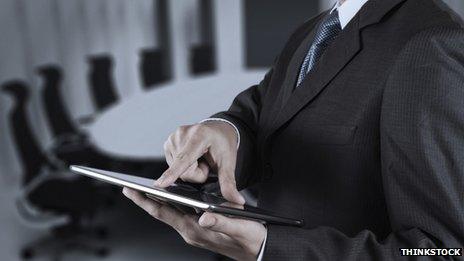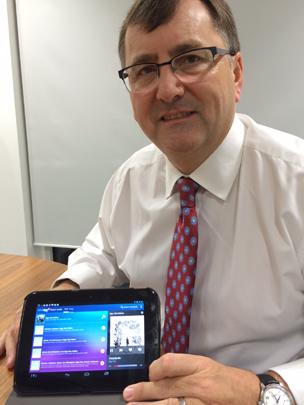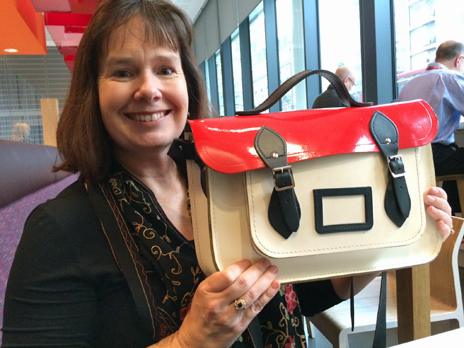Tech at the top - how bosses stay in touch
- Published

What challenges does fast-changing technology pose to anyone running a business? And how do CEOs and entrepreneurs take a long-term view in a world where your every decision is dissected by social media within seconds?
Those are the questions my editor asked me to address. I should explain that my editor, in this case, was Antony Jenkins, the CEO of Barclays., who is the Today programme's guest editor on New Year's Eve.
So I went to talk to three people who have scaled the heights of British business and entrepreneurship to get their take on how technology affects them.
Philip Clarke - CEO, Tesco

Philip Clarke, Tesco CEO
At 7.30am, one morning before Christmas, I found myself with an enthusiastic man desperate to show off his new toy, a tablet computer. "Look, you can stream all this music - what do you want to hear? Or maybe you'd like to watch a film?" Now middle-aged men with new gadgets can be tiresome - or so my wife tells me - but Philip Clarke's delight in Tesco's Hudl tablet was rather endearing.
The boss of Britain's biggest supermarket business has been having a challenging time of late, as Tesco struggles to keep on growing. But, as the company's former Chief Information Officer, his whole strategy is based on understanding how technology is changing his industry. "A few years ago I could see this wave of new competitors coming at us - companies nobody had heard of 15 years ago." He's talking about companies such as ASOS: "They're generating hundreds of million pounds worth of clothing sales - until four years ago we didn't have an online clothing business, and that's now growing 50% year-on-year. Customers are being changed by the internet and Tesco has to be part of that."
For a man in his 50s, keeping up with rapid change isn't easy, but Tesco has an innovative scheme where Mr Clarke and other senior executives are "reverse mentored" by someone in their twenties. His mentor, Paul Wilkinson, sits with him for an hour a week talking about how he lives his life and the new things he's seen. "He introduced me to Instagram - I hadn't heard of it."
I ask him what was the most exciting thing he'd been shown by his mentor: "Location services - and how they can be used in stores. He'd seen a TED talk and we sat and watched it on a tablet."
Interesting - it sounds as though Tesco may soon be experimenting with beacon technology which allows retailers to deliver information to customers' smartphones as they move around a store.
Julie Deane, founder, The Cambridge Satchel Company
Julie Deane is a case study in how mastery of the internet and social media can now allow you to create a global business in double quick time - so much so that Google used her story in an advert for its Chrome browser. It was only in 2007 that she decided to start the Cambridge Satchel Company - but very rapidly she was selling her products all over the world from her home. "On the internet nobody knows you're in your kitchen," she tells me.

Julie Deane of the Cambridge Satchel Company
Julie did not have access to much in the way of capital for marketing, so she used used every tool in the book to promote her company. She identified fashion bloggers as a key audience - and used them not just to market her satchels but to crowdsource a new product. "When we were looking at our first bespoke colour, we contacted fashion blog readers to choose it." Knowing there was a demand for that particular colour made the economics of tooling up for it stack up, she explains.
Like Philip Clarke, she is no digital native but believes passionately that anyone in business today needs to engage with social media: "You can't be ignorant about the importance of the whole social scene. Twitter, Instagram, Facebook, Vine, Tumblr - you need to keep up with the opportunities they offer. Get a group of teenagers in!"
Luke Johnson, serial entrepreneur
An investor in restaurant businesses from Pizza Express to Giraffe, Luke Johnson has spent nearly 30 years making mostly successful bets about British taste in restaurants.
You might think that the catering industry had little to fear from the digital revolution, but he begs to differ. "Whether it be stock control or logistics, marketing, social media or recruitment, almost every aspect of every business is being impacted," he tells me when we met in a busy cafe.
"If you don't continuously invest in upgrading and improving your technology then you'll fall behind and it may spell doom." This, he tells me, he learned to his cost when he saw his his investment wiped out in a firm which didn't see the need to keep up.
Rory Cellan Jones talks to business leaders about staying in touch with technology
In a recent column in the Financial Times, Luke Johnson bemoaned the fact that too many British businesses still didn't understand the need for technology expertise in the boardroom, with CIO standing for "Career Is Over". But in our conversation he is more optimistic. "The word geek is no longer an insult - it is becoming a compliment. More and more bosses realise that serious understanding of computer science and intimate familiarity with the potential of technology is a necessity for career progress."
So, three business leaders all convinced that they need to be at the cutting edge of technology. But what also struck me is that all three were struggling with information overload - groaning email inboxes, a blizzard of tweets and text messages - and were having to find ways of dealing with that . Philip Clarke told me he took time out from the internet - "you have to be disciplined, you have to switch off". Julie Deane said she made a point of leaving social media alone for an annual family holiday, and Luke Johnson said "the wear and tear on individuals expected to be constantly available" was a real concern.
The rewards for those who lead successful businesses are bigger than ever - but so are the pressures. No wonder that CEOs, like football managers, are finding that their time at the top may be shorter than they had planned.